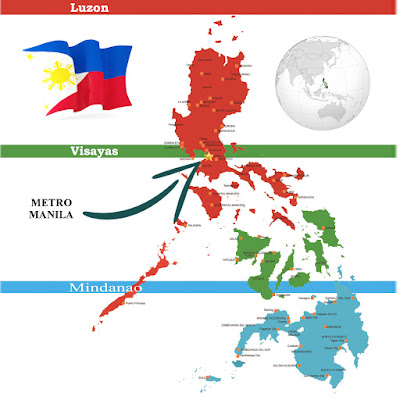The Cultural Divide Between Manila and Mindanao
I grew up in Mindanao. Now I live in Metro Manila. I cannot help but see the cultural divide between these two areas of the country.
What I have found since I enrolled as a freshman in UP Diliman are these:
1. When in a huddle, home-grown Manilenos tend to speak to each other in low voice, almost like making sure the guy next to him wouldn't hear a sound. When we huddle in Mindanao, it's a party! We express excitement! We speak to be heard by the whole world! We laugh even louder so it would be heard by Mars! My elder brother demonstrated that by letting me observe how people huddle in the dormitory lobby. Oh, how right he was (and is). I didn't find it very difficult to identify which people spoke Cebuano (the lingua franca in both Visayas and Mindanao).
2. Home-grown Manilenos tend to be very particular about words. Context-wise, I cannot think of a counterpart in Cebuano to the expression "ingatan mo yang bibig mo" (be careful with your mouth). Literally that would translate in Cebuano to "bantayi imong ba-ba", which I'm not sure we say frequently. You can more frequently hear Cebuanos say "pagbantay sa imong sinultihan" (be careful with the way you speak). They're obviously not the same, are they? Words, the literal words, mean a lot to Manilenos. In Mindanao (and I dare say Visayas as well), it's what you mean that matters more. It's easy to please a Cebuano by saying, "No, what I meant was . . ." Not in Manila, sorry to say. Here, they won't forget what you said. They would tolerate, but not forget what you said. Just look at the Manila-based media and it's easy to see what I mean. 3. When a Manileno hears something and asks, "Anong ibig nyang sabihin?" (What did he mean?), it is frequently an expression of anger or intense objection. Where I came from, when we ask, "Unsa'y gipasabot niya?" (What did he mean?) we usually really, sincerely, and honestly, wanted to know what he meant. If we wanted to express anger or objection, we would not say, "Unsa'y gipasabot nya?" We would say, "Wa'y puangod!" or "Wa'y batasan!" or "Galisngag lang ilong ani ay!" or "Wa sya kuyapeee?!?" 4. That leads us to expletives ... Cebuano-speaking people have a wide array of them. In Metro Manila, you could only hear P.I. most of the time. What other variants can you hear? "Lintik" ... is that even an expletive? You decide. I won't list here the expletives Cebuanos say, but just go and ask any Cebuano you know. Does this mean Cebuanos have dirty mouths? Not necessarily. We say them only when we're angry, the same as in Metro Manila. But we do say them (forgive our mouths), because we don't usually want to hide our displeasure. Culturally, Cebuanos are a very sanguine culture - what you see is what you get. Is that the same in Manila? You know the answer.
 |
| The sooner we recognize AND appreciate our cultural differences, the closer we are to authentic national unity. |
2. Home-grown Manilenos tend to be very particular about words. Context-wise, I cannot think of a counterpart in Cebuano to the expression "ingatan mo yang bibig mo" (be careful with your mouth). Literally that would translate in Cebuano to "bantayi imong ba-ba", which I'm not sure we say frequently. You can more frequently hear Cebuanos say "pagbantay sa imong sinultihan" (be careful with the way you speak). They're obviously not the same, are they? Words, the literal words, mean a lot to Manilenos. In Mindanao (and I dare say Visayas as well), it's what you mean that matters more. It's easy to please a Cebuano by saying, "No, what I meant was . . ." Not in Manila, sorry to say. Here, they won't forget what you said. They would tolerate, but not forget what you said. Just look at the Manila-based media and it's easy to see what I mean. 3. When a Manileno hears something and asks, "Anong ibig nyang sabihin?" (What did he mean?), it is frequently an expression of anger or intense objection. Where I came from, when we ask, "Unsa'y gipasabot niya?" (What did he mean?) we usually really, sincerely, and honestly, wanted to know what he meant. If we wanted to express anger or objection, we would not say, "Unsa'y gipasabot nya?" We would say, "Wa'y puangod!" or "Wa'y batasan!" or "Galisngag lang ilong ani ay!" or "Wa sya kuyapeee?!?" 4. That leads us to expletives ... Cebuano-speaking people have a wide array of them. In Metro Manila, you could only hear P.I. most of the time. What other variants can you hear? "Lintik" ... is that even an expletive? You decide. I won't list here the expletives Cebuanos say, but just go and ask any Cebuano you know. Does this mean Cebuanos have dirty mouths? Not necessarily. We say them only when we're angry, the same as in Metro Manila. But we do say them (forgive our mouths), because we don't usually want to hide our displeasure. Culturally, Cebuanos are a very sanguine culture - what you see is what you get. Is that the same in Manila? You know the answer.
Comments
Post a Comment